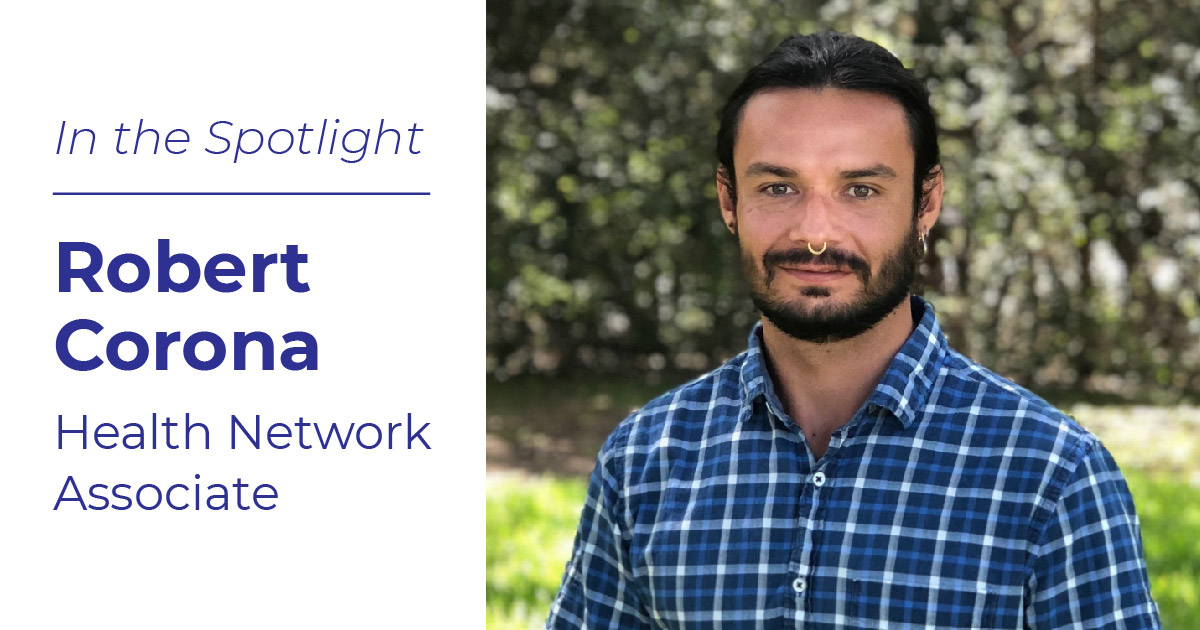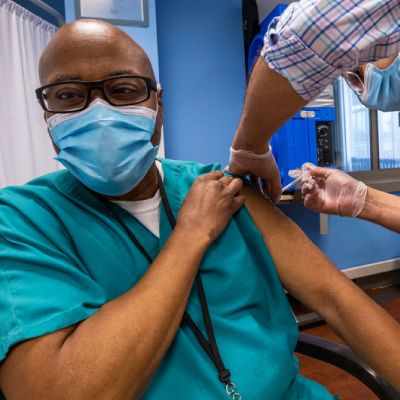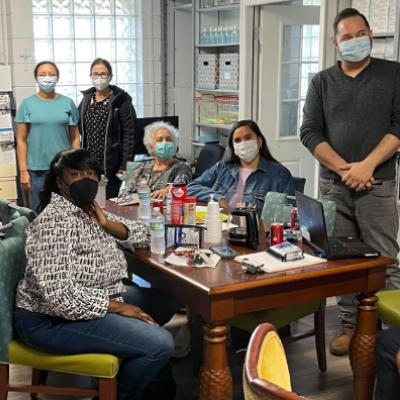- Who We Are
- Clinician Employment
- Publications
- Witness to Witness (W2W)
- Kugel & Zuroweste Health Justice Award
- Your Voice Matters: Photovoice Project
Wed, 12/05/2018 | by Monique Vasquez


[Editor’s Note: We’re once again shining a light on our Health Network team: the hardworking people who save lives by assuring continuity of care for migrants with ongoing health needs. Health Network is our bridge case management program that provides comprehensive case management, medical records transfer, and follow-up services for mobile patients. Here’s our third installment highlighting the Health Network team; click to read our previously published blog post about Saul and Alma. Many thanks to Health Network Intern Monique Vasquez for her work collecting these stories.]
“Rob is able to see everything through a social justice lens and still challenge things in such a gentle way.”
– Deliana Garcia Director, International Projects and Emerging Issues
Robert Corona first began to work for Migrant Clinicians Network’s Health Network in January 2015. A talented photographer with a love of traveling, Rob left the United States in September 2017, but continued to do contract work for MCN while he lived abroad in Southeast Asia; the 12-hour time difference allowed him to more easily reach clients in the Eastern hemisphere. After living and travelling in Cambodia, Laos, and Thailand, Rob is now back at Health Network’s office in Austin, Texas.
Rob is originally from El Paso, Texas. In addition to his work at MCN, he freelances as a photographer and translator in Spanish, French, and Portuguese. Over the summer, Rob and I talked about his work and his personal interests and where they interact. His responses are below.
What motivates you to work at MCN?
I like being a part of the process of helping people get to medical services. I know that whenever you are in a process that’s unfamiliar to you -- and I feel like a lot of our patients are in that kind of position for the first time, when they start some kind of treatment or medication -- it can be really confusing and anxiety-producing. And since our patients move around a lot I’m sure it’s hard to determine where they should go next or how they could continue getting their medication. So I guess just being a part of that, the process to help them get their medication, bridge that gap is really rewarding. It feels like a successful step forward.
I’m also motivated by continuing to try to find better ways to help the patients that we are in contact with and to find new avenues of helping them get what they need. I think as things change and laws and directives change at the national and state level regarding this population, it gets kind of tricky. Just continuing to be there for them, and to try to find ways to get people care despite the barriers put up by these directives and laws -- I feel like it’s the work that needs to be done.
What was it like working in Southeast Asia but still connected to this work?
It was nice, because I got to do what I wanted to do, which was to go there for personal development reasons and photography. Still being kind of in touch in some way was nice, and still having that link to the organization because I really like the organization and I love the people here. It got to have my cake and eat it too.
What is your favorite moment or accomplishment working with MCN?
There was once a patient who was maybe in her late 80s or maybe close to 90s. She was diagnosed with tuberculosis here in the US, and it was very positive, there was no gray area if she had it or not. She left to a country in South America. After she arrived, I spoke with her daughter, who answered the phone, to see how treatment was going and she said that a local physician said she didn’t have TB, and she was fine and could stop taking the medication. I tried to persuade her, telling her the results from the US clearly indicated she needed it. I ended up calling someone at the national level to report this case, and spoke with MCN’s chief medical officer, Ed Zuroweste, MD. Through different channels and speaking to different people in her country, they were able to send someone to speak with her family and let her know that she really needed the medication. Shortly afterward, she got back on medication, and completed the medication and treatment. I think the local physician could have potentially steered her in the wrong direction, and she could have gotten worse or, you know, something really bad could have happened if I hadn’t really persisted in this kind of intervention, especially considering her age and how active the tuberculosis was.
How have you grown or benefited from the work you do here?
I’m inspired by a lot of our patients, especially those patients who came to us when we used to work with the ICE facilities. I feel like a lot of our patients that are migrants are just so strong and tough. And a lot of times they just have a really positive outlook, even though they are facing some adverse conditions -- a lot of racism and some stumbling blocks along the way, for example -- to just get what they need in life. Their outlook and their persistence and strength are really inspiring and put a lot of things into perspective, that a lot of people out there are going through some really intense and challenging situations and [they] just keep looking forward and they have a really positive outlook.
What do you wish other people knew about MCN?
I would say specifically talking to clinics, that if you have patients that move around a lot and you are treating them, that we are here and we can help you as they leave their facility and we can help you keep up with them and even find out how their case wrapped up or ended and what that result was. So I guess just that we’re here, that’s what I’d like to let people know. We are available to really put that effort in to really keep the information coming in about different clients and patients.
Is there anything else you want to say about MCN?
It’s a really good team. I feel like it really attracts a certain type of individual that is really caring and has a big heart. Anyone contacting MCN, rest assured that everyone here has their mind and heart in the right place as far as what the work is and what they want to do as far as an impact on society.
Do you have a favorite quote?
I use quotes everyday for my Instagram photo processing. One of my favorite quotes is from a book I’m reading by Carlos Castaneda. His mentor tells him:
“Therefore you must always keep in mind that a path is only a path. If you feel you should not follow it, you must not stay with it under any conditions. To have such clarity you must lead a disciplined life. Only then will you know that any path is only a path and there is no affront, to oneself or to others, in dropping it if that is what your heart tells you to do. But your decision to keep on the path or to leave it must be free of fear or ambition. I warn you. Look at every path closely and deliberately. Try it as many times as you think necessary...This question is one that only a very old man asks. Does this path have a heart? All paths are the same: they lead nowhere. They are paths going through the bush, or into the bush. In my own life I could say I have traversed long, long paths, but I am not anywhere. Does this path have a heart? If it does, the path is good; if it doesn't, it is of no use. Both paths lead nowhere; but one has a heart, the other doesn't. One makes for a joyful journey; as long as you follow it, you are one with it. The other will make you curse your life. One makes you strong; the other weakens you.”
It makes me think of how life works and finding your path and choosing the one that’s right for you, and always asking the question, ‘is this path right for me?’ I feel like that’s a good thing that I lead my life by.
Do you have a favorite book?
My family. My mom would always tell me respect others like you want to be respected. So I feel like, just making sure that I always present myself in a matter where I don’t judge other people when I don’t really know them.
My culture [also drives me]. My mom has always said, ‘you have to embrace your culture, you need to speak Spanish to those who don’t speak Spanish, you need to celebrate the holidays we celebrate in Mexico, not just the ones in the US because you’re not just one person’… kind of like don’t just embrace one culture when we have two cultures.
Workwise, with everything that’s been going on with immigration and children, while we don’t work with detained immigrants face to face, I feel like it’s important that we help the mobile populations that we are able to help [through Health Network] even if it’s just through the phone that we get them their care. We have some patients who don’t speak English, and they ask, ‘Can I call you when I’m at the hospital or clinic?’ Sometimes the clinics don’t have interpreters that can help them so if they are able to call me then I am willing to do it.
For me, it’s about giving un granito de arena, or helping immigrants in the way I can, despite the political situation the way it is today.
I want to make a difference, but I know I myself cannot make it alone, so even if it’s just translating for a pregnant woman or making an appointment for an older man, even if it’s something small, I feel like if I can do that for someone then I’ve met my goal for that day.
It fluctuates, but mostly recently “Who Fears Death” by Nnedi Okorafor. It’s a science fantasy novel by a Nigerian-American author.
I’m currently reading “Viaje a Ixtlán” by Carlos Castaneda about anthropology and shamanism.
What is your superpower?
Not being affected, or not taking on any anxiety from a stressful situation. I think it might be a natural disposition, but I like to meditate, I do a lot of self-care and that translates to not really being affected by a lot of things.
How do you balance everything and manage stress?
I try to have everything I do as a self-care thing. I think walking in nature helps... Meditation, yoga, hiking, even going on a walk where it’s green. I find it really nice to play music at night time. Swimming at certain spots is really rejuvenating.
What brings you joy?
Being in nature, photography, relaxing and playing music, reading books.
Like what you see? Amplify our collective voice with a contribution.
Got some good news to share? Contact us on our social media pages above.
Return to the main blog page or sign up for blog updates here.







